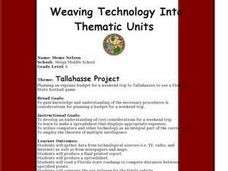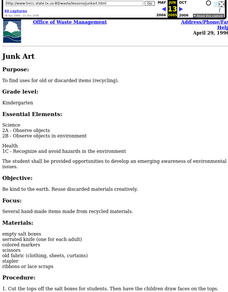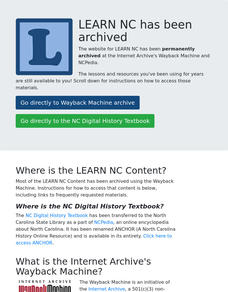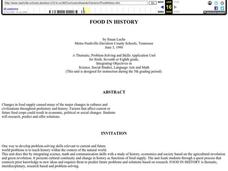Curated OER
Ecology: Trees
Fourth graders research and identify the different layers of the forest. As a class, they observe real-life trees or analyze a poster, and discuss the characteristics of each forest layer. Students then draw a forest and label the...
Curated OER
Counting in Espanol
Students create a mini-book with the Spanish numbers 0-10, then compare and contrast the English numbers to the new Spanish numbers.
Curated OER
Eatem Up!
Students identify, interpret and demonstrate a positive learning attitude. They identify, comprehend and use basic concepts and skills and then, communicate clearly in oral, artistic, written, and nonverbal form. Students also identify...
Curated OER
Transportation
Students identify and name at least six different kinds of transportion, sort and classify different kinds of transport according to similar and/or different characteristics and identify the purpose of different types of transportion.
Curated OER
Luxury Hotel
Give the most important people watching the Olympics a beautiful place to stay! Learners create a luxury hotel for the games using AppleWorks, fractions, and their knowledge of perimeter and area. The math instructional activity includes...
Curated OER
Political Cartoons: Literacy
Readers decode and deconstruct political cartoons to heighten critical thinking, extra-textual literacy, and making meaning from symbolism and metaphor. A compatible activity to use in English class when your 8th or 11th graders are...
Peace Corps
Celebrating Our Connections Through Water
Water is vital for survival, but how does it help global cultures flourish? Elementary and middle schoolers learn about the different cultures around the world that celebrate water and incorporate it into their festivals or traditions.
Curated OER
SURVIVING A COSMIC INVASION
Pupils read periodicals relating to radioacitivity and interpret a Geiger Counter. They work in small groups, share information and help each other explain the Geiger Counter. They discover the relationship distance to bombardment/contact.
Curated OER
Libros Y Amigos: Publishing Bilingual Books
Students review simple phrases and vocabulary in Spanish. In groups, they create at least one page of a bilingual class book with an illustration. Once the book is completed, they present their page to the class for another review of...
Curated OER
Triangles, Triangles, Triangles
Students view several different types of triangles. They discuss attributes of a triangle with a partner. Students use a straw cut into pieces to create a triangle. They complete a Triangle Hunt worksheet (teacher created). Students...
Curated OER
Celebrating Our Connections Through Water
Students examine the role of water in ceremonies around the world. In this world history instructional activity, students explore how other cultures celebrate water. They create a Water Day for younger students to participate in.
Curated OER
BEGINNER LEVEL LESSON PLAN ANTICIPATORY SET
Students are be able to analyze primary sources for evidence of American entrepreneurship during the early 20th century. They identify the attributes that helped George Eastman succeed as an entrepreneur and consider the role advertising...
Curated OER
Theme: Dinosaurs
Students identify at least ten different dinosaurs and name them. Students explain the difference between plant-eating dinosaurs and meat-eating dinosaurs. Students explain how scientists know about dinosaurs.
Curated OER
Tallahassee Project
Sixth graders gather information from technological sources such as TV, radio, and Internet as well as from newspapers and maps and produce a final printed report. They use the data to create a spreadsheet and read a Florida state...
Curated OER
Going Batty - Part II
First graders apply the knowledge they've gained about bats to create bat poetry.
Curated OER
Wildlife, Wolves, Endangered Species
Learners use the Internet to research wildlife and conservation efforts. They examine pictures and graphics to research endangered species and humans role in their lives. They also use math to measure areas of habitats and add the number...
Curated OER
Poetry
Fifth graders are introduced to poetry and many authors who create it. In this language arts lesson, 5th graders create a class poetry book. Each student submits an original poem, along with an illustration.
Curated OER
Food in History
Students research, predict and offer solutions regarding factors that affect current or future food crops could result in economic, political or social changes.
Curated OER
Seeing/Reading Photographs Lesson Plan: An Interactive History Discussion
Students analyze and read historic photographs. For this historic photographs lesson, students explore history and writing by looking at photographs. Students discuss the photographs and produce a written record of the historical...
Curated OER
The Arctic and Taiga Ecozone of Canada
Learners discover the differences in the Arctic and Taiga regions of Canada. They identify physical and human characteristics of both region. They also practice using an atlas.
Curated OER
The Arctic and Taiga Ecozone of Canada
Learners examine the various sub-regions of the Arctic and Taiga zones in Canada. Using the online Canadian Atlas, they locate and describe the characteristics of each zone. They organize their information into a chart and share it with...























